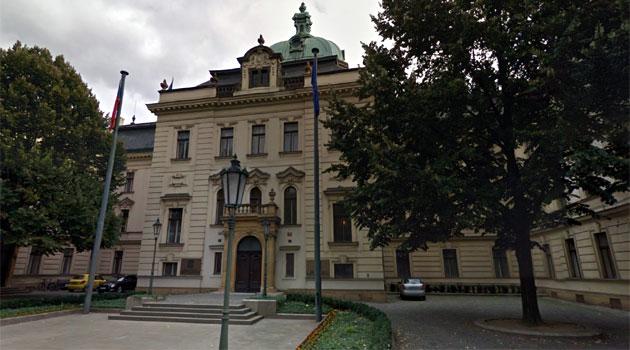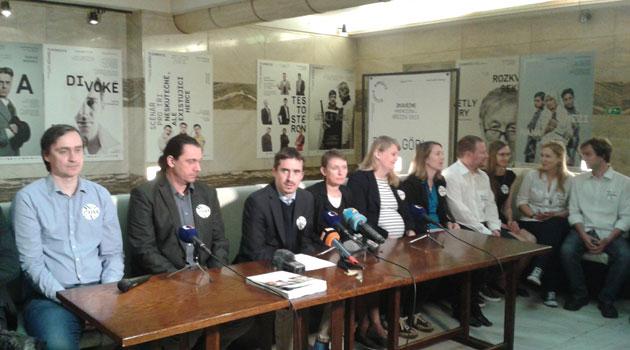Romani civil society members of Gov't advisory board say social inclusion staffers should leave if they are unhappy

Several civil society members of the Czech Government Inter-ministerial Commission for Roma Community Affairs issued a statement yesterday on the situation inside the Czech Government Agency for Social Inclusion. "There is evidently no other solution to this situation than the departure of the employees who are unsatisfied. We are fully aware that the situation is not an easy one and that the current employees are conveyors of experience and good practice in the area of social inclusion, but we must strongly object to the statements made by Mr Šimáček and other Agency employees to the media and on social networks alleging that the civil society members of the Czech Government Inter-ministerial Commission for Roma Community Affairs are behind the removal of Mr Šimáček and are attempting to destabilize the Agency. Those remarks are intentionally misleading. The aggressive, demagogic media campaign being waged by the Agency harms its good name and that of all the actors involved in social inclusion work," the statement reads.
News server Romea.cz publishes the statement in full translation below:
On 7 May 2015 yet another meeting was held in the matter of the future operations of the Agency for Social Inclusion (hereinafter the "Agency") and the Social Inclusion Department of the Office of the Government of the Czech Republic, which is managing that project. During the three-hour meeting there was a rather open discussion of the current situation at the Agency between its temporary leadership, representatives of the Czech Government Inter-ministerial Commission on Roma Community Affairs, representatives of several ministries, the Agency’s Monitoring Committee, and the Minister for Human Rights, Equal Opportunities and Legislation.
Prior to the realization of this meeting, the Human Rights Minister and his Deputy Minister, met with Agency employees more than once – even though the employees themselves claim that no one is negotiating with them. It must be noted that these meetings always lasted several hours.
In addition, representatives of the Agency have always been present at all of the negotiations that aimed at solving the current situation. The Deputy Minister opened the 7 May negotiations by familiarizing those present with the current situation and the demands made by the Agency employees of the Human Rights Minister and his team.
The employees received clearly positive answers to two of their three demands. Specifically, their demands for continuity and transparency were acceded to.
The Agency employees, however, are not reflecting on these concessions at all. They were given a negative response to their third demand for autonomy.
This response was not because the Human Rights Minister does not want the Agency to be independent, but because, according to him, the currently applicable legislation will not permit it and there is no political will at this time to set up a whole new office. Even if he were to succeed in getting the Government to agree, it would take a year at the least for such a new office to be created.
He also said the Agency cannot be set up as a separately administered but still state-funded organization, because then it would not be possible to raise money for it from the EU. Both the deputy minister and the minister also told the employees that they will not proceed on 1 July with the reorganization changes that have been speculated about in the media.
If any changes are supposed to occur, the minister promised to discuss them with the employees. Unfortunately, even these answers were not sufficient for the Agency employees to call off their advertised strike.
The employees are not attempting in any way whatsoever to hold a constructive dialogue that would lead to an actual resolution to this situation. It is difficult to evaluate the current situation as an effort to reach agreement.
The current demands of the Agency are unacceptable and unrealistic. The Agency’s Monitoring Committee has now offered the staff the option of creating a Working Group that would be an expert space for discussion where representatives of the Agency and the Monitoring Committee could convene.
The Monitoring Committee also asked the union organization to postpone the strike so room for construction negotiations would remain. Last week a meeting with civil society representatives of the Czech Government Inter-ministerial Commission on Roma Community Affairs was held in the same spirit.
However, the civil society members of the Inter-ministerial Commission are forced to state, after these intensive debates, that there is evidently no other solution to this situation than the departure of the employees who are unsatisfied. We are fully aware that the situation is not an easy one and that the current employees are conveyors of experience and good practice in the area of social inclusion, but we must strongly object to the statements made by Mr Šimáček and other Agency employees to the media and on social networks hinting that the civil society members of the Czech Government Inter-ministerial Commission for Roma Community Affairs are behind the removal of Mr Šimáček and are attempting to destabilize the Agency.
Those remarks are intentionally misleading. The aggressive, demagogic media campaign being waged by the Agency harms its good name and that of all the actors involved in social inclusion work.
It is the striking staffers in particular who are destabilizing the situation, even if that is not their intention. Moreover, the employees of the Agency are violating the Employee Code of the Office of the Government of the Czech Republic, which is binding on all employees.
We are of the opinion that a selection procedure is a sufficient guarantee, just as it was six years ago, that a top-notch director will be chosen to run the Agency. Casting doubt on that procedure creates the impression that the employees of the Agency want to create pressure such that competent candidates will be afraid to apply.
We respect the minister’s decision in the matter of the removal of Mr Šimáček from the post of director of the Department for Social Inclusion even though not all of us agree with it. The department was tasked with producing project plans in February and under Mr Šimáček’s leadership has not yet completely delivered them despite being repeatedly called upon to do so.
Active communications are underway with the managing authorities and it is certainly inappropriate to speak of a lack of trust in this respect. The current team of department staffers is actively contributing to the continuity of the work in the localities and the removal of the director should not change anything about their activity in the field.
This brief description should make it evident that the deputy minister and minister are definitely not neglecting any basic, crucial points and are doing their best to actively resolve this crisis. Also, the Government’s Roma Integration Strategy to 2020 is a valid strategic document that is binding on all state officials involved in Romani integration.
Agency employees were among those who helped to design the Roma Integration Strategy but if they are now are no longer able to identify with its vision, then they actually have only one option, and that is to leave the state administration. On the other hand, we must emphasize that there is no pressure being generated by the civil society members of the Czech Government Inter-ministerial Commission for Roma Community Affairs on the Agency employees to change the concept of their work.
Bc. Emil Horvát
Mgr. Dis. David Beňák
Bc. Lenka Balogová
PhDr. Jana Horváthová
Mgr. Jan Kudry, Ph.D
Ing. Karel Holomek
Miroslav Zima
Ján Balog
František Bikár
Čeněk Růžička
